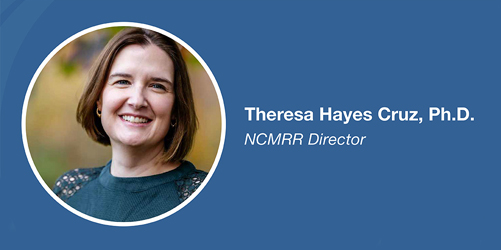 How did you become interested in science and research?
How did you become interested in science and research?
I’ve always been interested in math and science. I really liked being one of the only girls in advanced math classes. That love of math and science led me to pursue an engineering degree. I went into biomedical engineering, specifically for the connection to promoting health and function. As an undergraduate, I worked in a research lab in a rehabilitation hospital and met wonderful people with stroke, traumatic brain injury, spinal cord injury, and other physical impairments. That experience inspired me to pursue a Ph.D. and research career.
What brought you to NICHD?
When I was getting close to the end of my Ph.D., I realized that I didn’t love being in the lab enough to make a successful research career. Being a principal investigator, or PI, and leading a research lab takes a lot of grit and determination, and if you don’t love it, then it wouldn’t be a happy life. I also didn’t have a lot of role models for women PIs in engineering departments. So, I decided to pivot. I had a very supportive mentor who introduced me to several people at NIH and one of them was looking to hire a program analyst. I got the job, and the rest is history.
What types of training, experiences, or traits are essential for success in your position?
First and foremost, rehabilitation should be based around the needs and desires of the person participating in the care. I learned this powerful lesson through my experiences working with people with physical disabilities in the inpatient and outpatient settings and talking to care partners and family.
Second, training in research is important. It helps you know what makes a good research project and to ask applicants the right questions to help them submit the strongest application possible.
My current position involves interfacing with the public, so it’s important to be comfortable and confident in communicating science to many different audiences. You also need to have a service mindset—we are stewards of public trust (and funds).
The National Center for Medical Rehabilitation Research, or NCMRR, is incredibly collaborative because of the legislation that established the center, but also by the nature of rehabilitation, which is interdisciplinary.
What do you find most valuable about working at NICHD?
I find the NICHD mission extremely rewarding, and the people who support it are our most valuable assets.
Can you explain your job to people who are not familiar with scientific positions outside of a laboratory or clinical setting?
NCMRR supports researchers and trainees across the country to conduct research to improve the health and quality of life for people with physical disabilities. Some of that work involves developing new assistive technologies, like prosthetic limbs, exoskeletons, or wheelchairs. Some of it involves finding new ways to help the body re-learn a function that has been lost, usually through neuroplasticity or some other physical mechanism. Some research is focused on keeping people as healthy as possible with their limitations—increasing physical activity, reducing obesity or pain, and preventing infection and cardiometabolic syndromes. That work has a combination of behavioral science and technology. We also consider a person’s environment—how we can support people with disabilities in their communities and homes to participate in the activities of their choice.
If you have advanced along your career within the institute, can you summarize your career steps and how you successfully navigated these changes?
I started at NICHD in 2009 as a program analyst, and I defended my Ph.D. thesis a couple months after I started. I have moved up and over, sideways, and backwards in the 13 years since I started. I spent a couple years learning about NIH and figuring out what career I wanted here. I spent time learning how to be a program officer, which I enjoyed immensely. Talking to people about the work they are passionate about, helping them find a place at NIH to be successful—that was very meaningful work for me. I did a detail at the NIH Clinical Center to brush up on my research skills. I think it is very important to maintain connections to both the patients and the research environment. The experience made me a better program officer.
In 2019, I became the acting director of NCMRR, and in 2020, I was selected as permanent director. It has been a productive time despite the challenges of the pandemic. We hosted a major conference in October 2020 with more than 1,300 attendees. The center has amazing staff and working with them is a pleasure.
What advice can you offer to people who are at an earlier stage of their career?
Find mentors and sponsors; they are different people. You can learn from everyone, every experience. When you have an opportunity, take it, even if you aren’t sure you can be successful.
Return to Get to Know NICHD.
 BACK TO TOP
BACK TO TOP